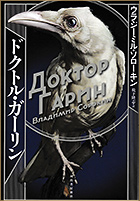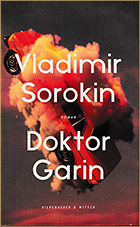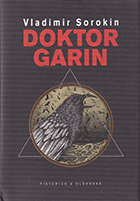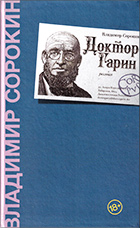Vladimir Sorokin
Doctor Garin
Proposal
Published by
- Corpus, Moscow
- Rights acquired by
- Pistorius & Olsanska, Czech Republic
- Kiepenheuer & Witsch, Germany
- Gondolat Kiadó, Hungary
- Curtea Veche, Romania
- Dar AL-Rafidain, Lebanon
- La nave di Teseo Editore, Italy
- New York Review of Books, USA
In Vladimir Sorokin’s new novel, the reader meets an old acquaintance: Doctor Garin from The Blizzard. At the end of that book, Garin, unable to reach his goal of vaccinating the inhabitants of Dolgoe against the “filth”, ended up being captured by the Chinese. And now ten years have passed. Garin is the chief physician at the Altai Cedars Sanitorium, a psycho-neurological clinic for wealthy clients. During those ten years, an Islamic revolution and three continental wars have swept through Eurasia. Power has passed from politicians to the military. Permanent war has become a commonplace. And a nuclear bomb is dropped somewhere almost every month. In this new world, a world split into many states, “the luxurious and monumental fireworks of bloodied mud” never quiet. And only at the Altai Cedars Sanitorium, a setting nestled in exquisite nature, does the world exude peacefulness.
Platon Garin has changed very little; he’s still just as broad and sprawling, but stands more firmly upon the ground with his titanium legs (a consequence of frostbite in the village of Dolgoe). The 8 patients of the sanitorium are “political beings”, or, as the staff of the sanatorium affectionately refers to them, “booties.” Indeed, they bear a striking resemblance to walking buttocks. They drink medicinal cocktails, take mud baths, and receive the lifegiving green shock of Garin’s blackjack. But, at lunch and dinner, they inevitably begin to argue, echoes of old political battles. The freckled Boris is categorically against the postwar unification of the United States of Europe. Angela and Emmanuel always support each other. They are annoyed by the boorish, unceremonious, and narcissistic Donald, who sauces all the food he eats with Coca-Cola. Silvio is still friends with Vladimir, although the latter is a poor conversationalist, able only to babble, “it isn’t me!”
This idyllic world is shattered by an atomic bomb dropped by the Kazakhs. The survivors are borne forth from the sanitorium by enormous robots known as Mayakovskys. And thus begins their long road to an illusory peace in a world seething with conflict. On their way, they’re met by masters of stone clockmaking and descendents of the Italian nobility suffering from an ailment that softens the bones in their legs. The travelers find themselves in a militarized anarchist settlement with monuments to Bakunin and Kropotkin. Here, Garin saves Anarchy, their goddess, from a prolonged bout of constipation and this tiny living statuette arranges an anarchic orgy as a token of her gratitude. One Count Snowdrift saves the travelers from a band of brigands. And the reader finds himself immersed in the atmosphere of a nineteenth-century Russian estate––with a banya, serfs, decadent refections, duels with swords, and long philosophical discussions about the oneness of all human moral principles and the worldwide return of the homo medii aevi. Angela is an especially enthusiastic participant.
The final goal of their journey is Barnaul, a carnivalesque city, a Noah’s Ark where the most unprecedented individuals have gathered, everyone from Lilliputians to biguns to nothings––“where’s the head, where’s the face, where’s the body?” And Garin and his beloved Masha are finally able to rejoice in each other endlessly. Plus the surviving patients are getting on fantastically. Angela visits plastic surgeons and gets ready to visit friends in Switzerland. Silvio, Vladimir, and Donald have opted for careers in the circus with deadly routines and fantastic prophecies.
The treacherous Kazakhs sign a peace treaty with the Republic of Altai, but start bombing Barnaul a few hours later. One of the bombs falls on Aquaworld, where Garin and Masha are having a spa night. Garin makes his way through the forest in a bathrobe and prays that Masha was able to escape. In the President of the Republic of Altai’s plane, shot down by Kazakh artillery, he finds an old metal bound book––a magical book about the White Crow, the very one a bookseller told him about in Barnaul.
Garin attempts to make his way to Khabarovsk, where he has a position as chief doctor in a psychiatric hospital lined up. And, of course, he must find Masha. But many adventures await him on his winding path. He finds himself in a bigun’s house, which resembles a giant matryoshka doll, and cures the giantess of her infertility, removing an enormous pearl from her uterus. But, early one morning, he ends up having to flee from her big love. And he sails away on a boat along the Ob in the direction of Khabarovsk. The next stop is the Vitaminders, amongst whom Garin meets an old pal he hasn’t seen in 10 years. Now, the drug dealers have everything automated: drones come flying in every once in a while with an order and the money to pay for it. They allow him to try a new product––the “lil’ pyramid.” Garin’s trip is one of the richest episodes in the novel. An ascetic who refuses to eat for many years turns into a table, which becomes an exhibit at a museum. “People look at me. They just look. They come into this white building, pay money, and look at me. This goes on for years. Decades. Centuries. Which become Eternity.”
Garin’s negligence in having decided to spend the night in a pine forest ends up making him the captive of a tribe of swamp dwellers––the “filthies.” In 1969, KGB agents managed to steal American genetic research regarding the creation of super soldiers, impervious to the cold and unfavorable climatic conditions. Two years later, the Senate shut down the American project. But the Soviets continued and eventually created super soldiers, meekly sitting in cold trenches for months at a time and always ready for hand-to-hand combat. After the collapse of the Soviet empire, the filthies created their own state––a huge swamp Venice made of tree trunks and other wooden debris. The prisoners have a very strange job here––carving smartphones out of wood. Later, Garin will understand that this is the basis of a magical ritual designed to overcome the people of the civilized world. And the roaring hearth of an ecstatic rite. Once a year, the filthies set fire to an enormous tree made of wooden smartphones so as to have sex. Thanks to this ritual, their population is growing rapidly. Garin is also in demand here as a doctor, though hopeless patients are simply drowned in the swamp. His overseer, translator, and assistant is an albino filthy, which, for this tribe, is like being a leper and no one is allowed to touch her. This “woman” with the strange name Tsbyukhrr helps the doctor to escape from captivity in exchange for carnal love. And there’s so much aching tenderness for that otherworldly creature in this scene that any author of romantic novels might well get jealous upon reading it.
Garin’s path leads toward Khabarovsk, but a blizzard begins to blow. So as not to freeze, he burns the pages of the White Crow’s book with drawings in the style of Asian or Arabic miniatures, pictograms, and repetitive depictions of ritual offerings to the Crow. Numb with cold, Garin draws the magical circle and triangle in the snow and places the Matryoshka’s pearl down into it.
“The Crow sat in the center of the circle. Alive. Actual. White. Unbelievably beautiful. Two times bigger than an ordinary crow. Its whiteness was of a different shade than the snow, with a barely noticeable bluish tint. Its pink eye and black pupil stared unblinkingly at Garin. Its powerful white beak was slightly curved at its tip.”
A few minutes later, Garin hears the roar of an airplane’s engine…
In Khabarovsk, he finds his Masha. “SHE––dark, lithe, and unbelievably thin––arose before him, standing in the mouth of the lane with its streetlight, and collapsed forward onto her only knee, and embraced him with her single arm, and pressed herself to him, instantaneously recognizing her Garin in this trembling, wet, and reeking monster.
There were neither words nor names.
Both of them were on their knees, embracing each other with their three arms.
The occasional passerby skirted ‘round them.
The snow was tumbling down.”
This is a very abbreviated summary of the novel’s plot.
Sorokin never ceases to amaze the reader with his masterful ability to juggle genres. This “road novel” contains elements of genres dystopian, satirical, epistilatory, fantastical, and even cyberpunk. Every now and then, fragments of the past burst forth into the fabric of the novel in the form of excerpts from diaries, fragments of cheap serialized novels, dissident literature from the era of the Soviet Union, and other trashy literature of the distant (and not so distant) past.
Even so, despite the recognizability of this unsurpassed master of style’s method, Doctor Garin is an old-fashioned novel in the best way possible. Sorokin definitively confirms his right to a place in the pantheon of classic Russian writers alongside Tolstoy, Turgenev, Gogol, Chekhov, and Nabokov… His heroes, though they live in the middle of the twenty-first century, find themselves caught off guard by the reemergence of the flames of war, like Pasternak’s heroes in Doctor Zhivago or Bulgakov’s in The White Guard. There too, an idyllic way of life crumbles, destinies are shattered, and everyone finds themselves on a lengthy “walk of agonies.”
Doctor Garin is an epic novel written in bewitchingly noble language, a novel like a river, powerful, but with many rapids and whirlpools. “These days, everyone is trying to adjust, searching for a form of survival. And the world carries us like a river. It doesn’t adjust to us. It doesn’t take us into account whatsoever, doesn’t ask questions, doesn’t offer anything. It flows within its limits, into its own ocean of Eternity.” Garin’s drug trip involving a living being who, by sheer force of will or lack of willpower, turns into a table in a museum refers the reader back to Dostoevsky’s Alyosha Karamazov with his “miracle of belief.”
Garin is different––a real Russian intellectual, a typical hero of Russian literature: “We’re wood shavings. Or perhaps not. Wood shavings have no force of will. They simply surrender to the elements, whereas I row. We row and rule over. We shovel our way out. Search for our own paths and shores. The Snowdrift family, Mother Anarchy, and the unfortunate Buddhist Wang Hong were all searching. I’m searching too. And Masha was searching… no… is searching! Is searching!”
There’s always been a great deal of eroticism in Sorokin’s work, but never any love. Doctor Garin is an exception. A penetrating and sincere love that survives the chaos and blood of war helps Masha and Garin to find the meaning of life. Sorokin as Humanist is an unexpected turn for the writer’s work to take, but a very Russian one: only love shall save the world.



